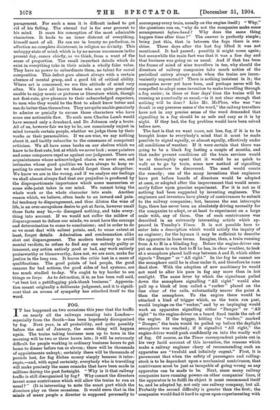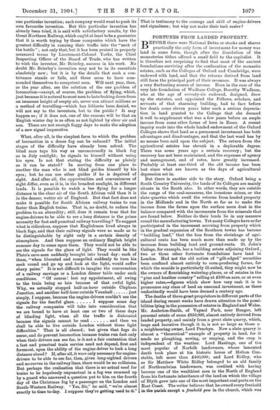accompany every train, usually on the engine itself.) "Why," the
questions run on, "why do not the companies make some arrangement before-hand? Why does the same thing happen time after time ?" The answer is perfectly simple ; being just this, that in between the fogs there is sun- shine. Three days after the last fog lifted it was not mentioned. It had passed ; possibly it might come again; but meanwhile the main fact was that it was a fine day and that business was going on as usual. And if that has been the frame of mind of nine travellers in ten, why should the directors of railway companies take much notice of the periodical outcry always made when the trains are incon- veniently unpunctual ? There is nothing insistent in it ; the companies never yet have been, and perhaps never will be, compelled to adopt some invention to make travelling through a fog easier; in three or four days' time the trains will be running as punctually as usual,—is it not clear enough that nothing will be done ? Like Mr. McPhee, who was "no drunk in ony preceese sense o' the word," the railway travellers have not in any precise sense of the word demanded that signalling in a fog should be as safe and easy as it is by night. If they had, the fog problem would have been solved before now.
The fact is that we want more, not less, fog, if it is to be .
brought home to everybody's mind that it must be made possible to signal equally, or almost equally, effectively under all conditions of weather. If it were certain that there was going to be a black fog lasting a couple of months, and that under present conditions all the train services would be so thoroughly upset that it would be as quick to walk as to go by train, some new method of signalling would somehow be discovered. The need would create the remedy ; one of the many inventions that engineers have put before boards of directors would be adopted at once, or adopted after the improvement that would neces- sarily follow upon genuine experiment. For it is not as if nothing had been suggested by inventing engineers. The engineers and inventors have plenty of contrivances to submit to the railway companies ; but, because the sun interrupts fogs, there has never been an absolutely driving necessity for the companies to adopt, or at least to experiment on a large scale with, any of them. One of such contrivances was described in an extremely interesting article which ap- peared in Tuesday's Times. It is not possible here to enter into a description which would satisfy the inquiry of an engineer; for the layman it may be sufficient to describe the apparatus in loose terms. Imagine, then, a train running from A to B in a blinding fog. Before the engine-driver can put on steam to run fast to B he has, in clear weather, to look at a semaphore placed half-way between A and B, which either signals " Danger " or "All right." In the fog he cannot see the semaphore until he is close under it, and therefore he runs dead slow. With the adoption of new machinery he would not need to alter his pace in fog any more than in hot sunlight. The same lever by which the signalman pulled down the semaphore signalling "All right" would also pull up a block of iron called a "rocker" placed on the line clear of the rails, substantially nearer the point A than the semaphore. To the engine there would be attached a kind of trigger which, as the train ran past, would impinge on the "rocker," and by so impinging would work an apparatus signalling either "Danger" or "All right" to the engine-driver on a board fixed inside the cab of the engine. If the trigger, hitting the "rocker," marked " Danger," the train would be pulled up before the daylight semaphore was reached ; if it signalled "All right," the engine-driver would push confidently on into the woolly wall of fog. Of course, as the Times correspondent points out in
his very lucid account of this invention, the reasons which make a railway engineer chary of recommending such an
apparatus are "twofold and infinitely cogent." First, it is paramount that when the safety of passengers and rolling- stock is to be dependent upon a mechanical contrivance, that contrivance must be just as incapable of going wrong as any apparatus can be made to be. Next, since many railway companies have running powers on other companies' lines, if the apparatus is to fulfil its object it must recommend itself to, and be adopted by, not only one railway company, but all. Probably the second difficulty is greater than the first; the companies would find it hard to agree upon experimenting with one particular invention; each company would want to push its own favourite invention. But this particular invention has already been tried, it is said with satisfactory results, by the Great Northern Railway, which ought at least to be a guarantee that it is worth trying by those companies which have the greatest difficulty in running their traffic into the "neck of the bottle" ; not only that, but it has been praised in properly measured terms by Lieutenant-Colonel Yorke, the Chief Inspecting Officer of the Board of Trade, who has written to wish the inventor, Mr. Brierley, success in his work. No doubt Mr. Brierley's invention may not be in its essentials absolutely new ; but it is by the details that such a con- trivance stands or falls, and these seem to have com- mended themselves to competent men. Will next year, then, or the year after, see the solution of the one problem of locomotion—except, of course, the problem of flying, which, just because it is natural to most men to hate looking down from an immense height of empty air, never can attract millions as a method of travelling—which has hitherto been denied, we will not say to the inventors, but to the public ? It may happen so; if it does not, one of the reasons will be that an English winter day is as often as not lighted by clear air and sun. There are not enough foggy days to make the adoption of a new signal imperative.
' What, after all, is the simplest form to which the problem of locomotion in a dense fog can be reduced ? The initial stages of the difficulty have already been solved. The blind man taps his way as unconcernedly in black fog as in July sunlight; be signals to himself without using his eyes. Is not that stating the difficulty as plainly as it can be stated? In moving from one place to another the man who is not blind guides himself by his eyes ; but he can use other guides if he is deprived of sight. And after all, the opportunities and conveniences of sight differ, even as it is, in the broadest sunlight, in different lands. It is possible to watch a bee flying for a longer distance in the clear air of the South African veld than it is in the denser, wetter air of England. But that fact does not make it possible for South African railway trains to run faster than English trains. That is, no doubt, to reduce the problem to an absurdity; still, does it remain true that for engine-drivers to be able to see a long distance is the prime necessity for fast and punctual railway travelling ? To suggest what is ridiculous, suppose that Englishmen lived always in black fogs, and that their railway signals were so made as to be distinguishable by sight only in a certain density of atmosphere. And then suppose an ordinary English bright summer day to come upon them. They would not be able to see the signals for the glare of light. They would be like Plato's cave-men suddenly brought into broad day: each of them, "when liberated and compelled suddenly to turn his neck round and go up and look at the light, would suffer sharp pains." It is not difficult to imagine the conversation of a railway carriage or a London dinner table under such conditions. "Of course ! lost my appointment, all owing to the train being so late because of that awful light. Why, we actually stopped half-an-hour outside Clapham
Junction, and another half-hour outside Vauxhall just simply, I suppose, because the engine-drivers couldn't see the signals for the fearful glare I suppose some day the railway companies will take into consideration that we are bound to have at least one or two of these days of blinding light, when all the traffic is dislocated
because the signals cannot be read and then we shall be able to live outside London without these light difficulties." That is all absurd ; but given that fogs do occur, and do prevent locomotion because trains run fast only when their drivers can see far, is it not a fair contention that a fast and punctual train service need not depend, first and foremost, upon the ability of the engine-driver to look a long distance ahead? If, after all, it were only necessary for engine- drivers to be able to see far, then, given long-sighted drivers and no curves in the railway lines, there would be no collisions. But perhaps the realisation that there is no actual need for trains to be hopelessly unpunctual in a fog was summed up by a guard who answered a question put to him on the fourth day of the Christmas fog by a passenger on the London and South-Western Railway. "Yes, Sir," he said, "we're almost exactly to time to-day. I suppose they're getting used to it."
That is testimony to the courage and skill of engine-drivers and signalmen; but why not make their task easier?



































 Previous page
Previous page